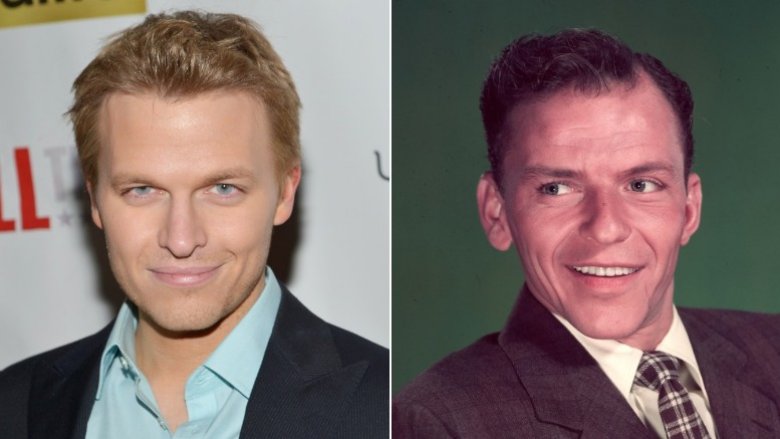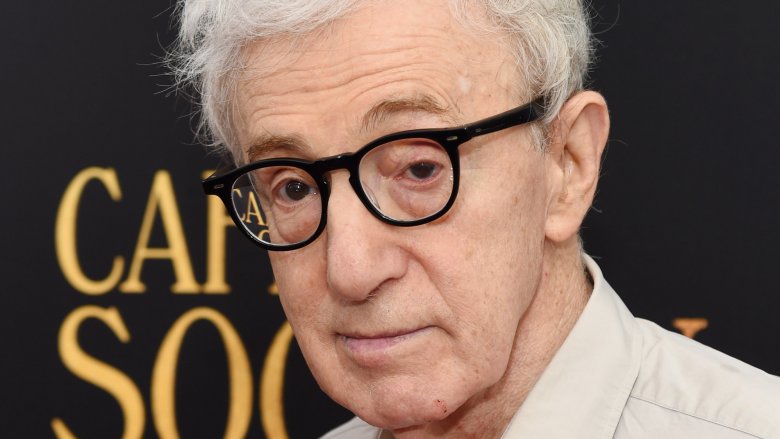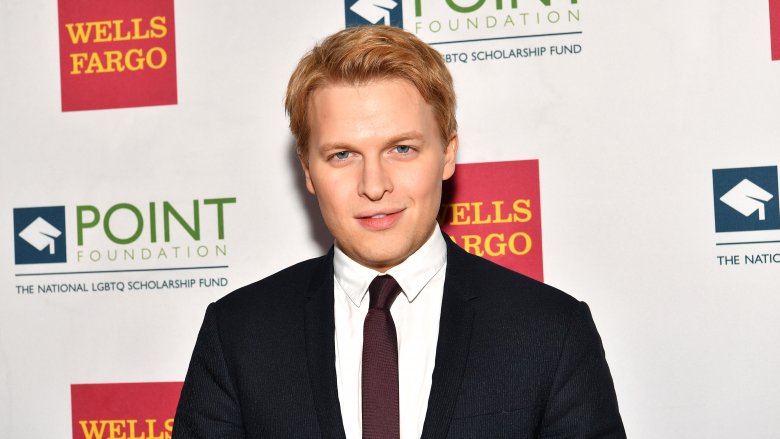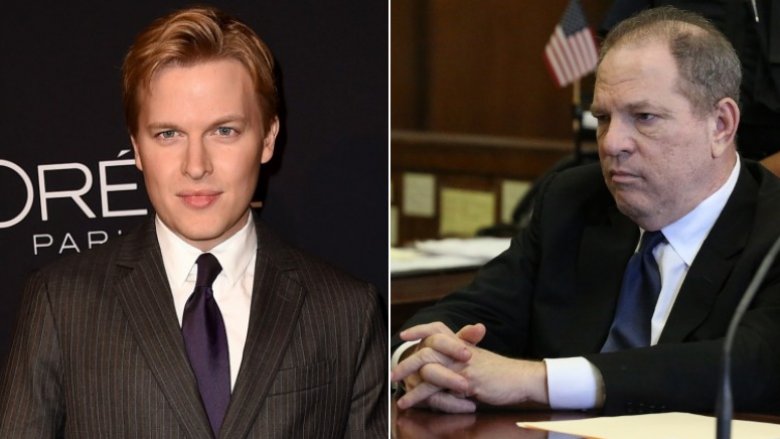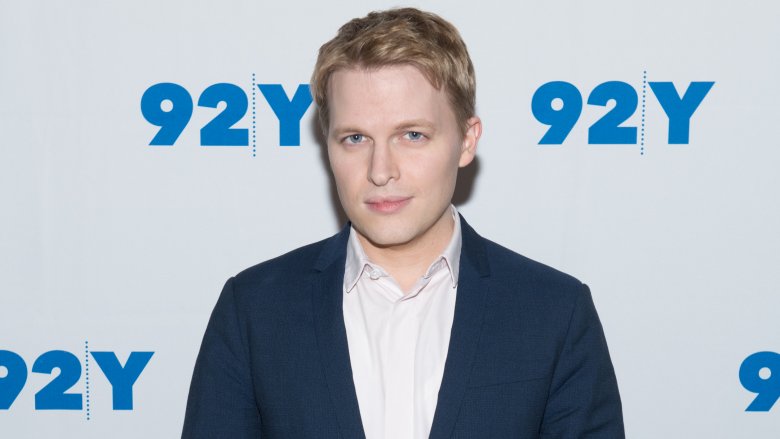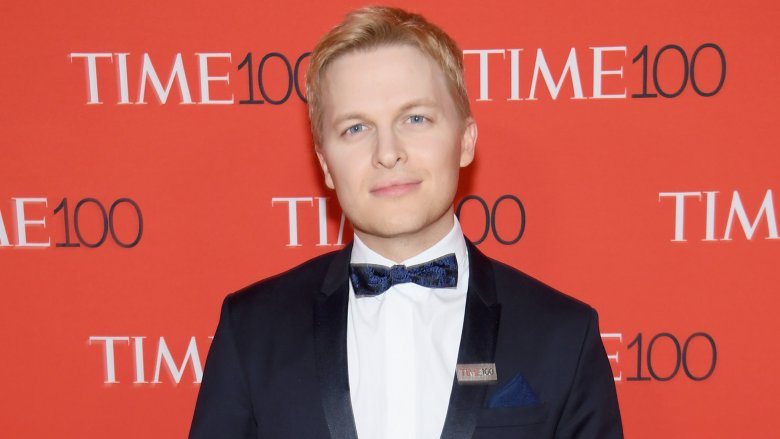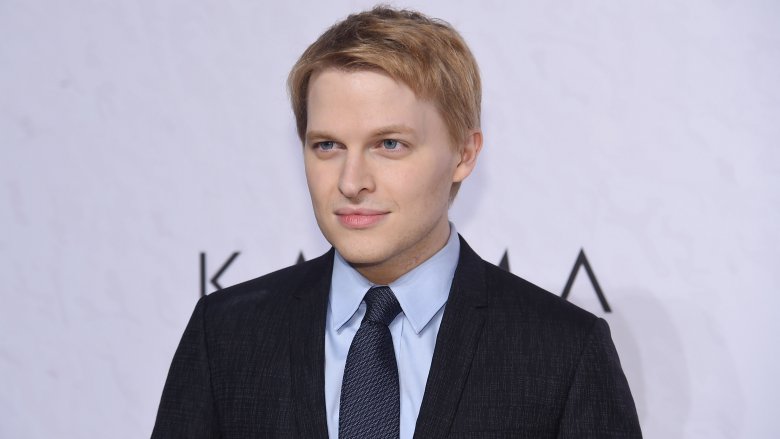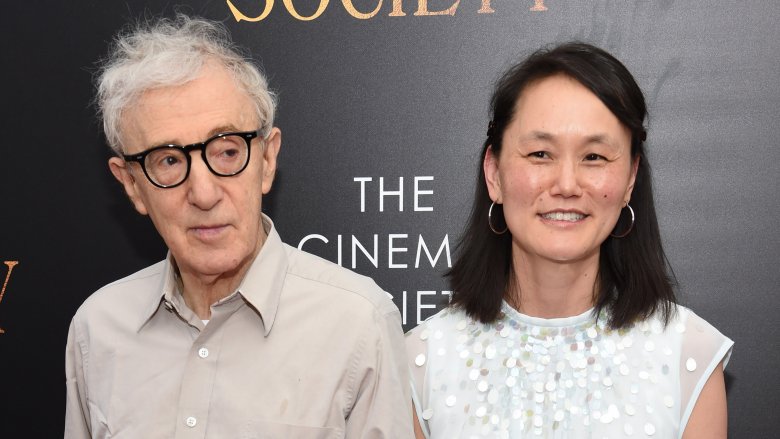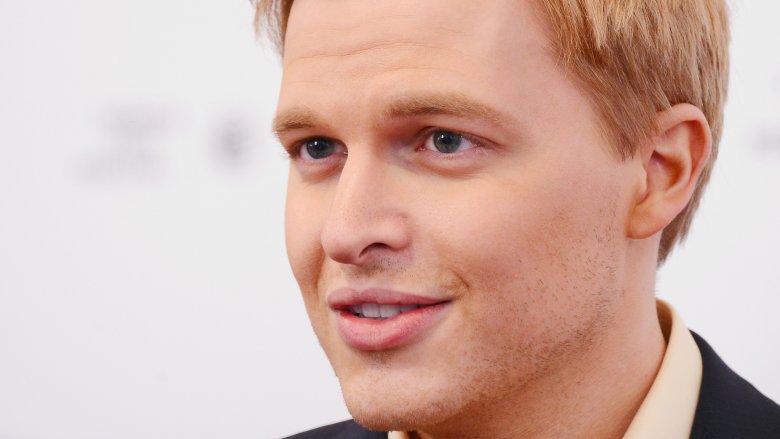The Untold Truth Of Ronan Farrow
"You see early in life with that kind of a family background the way in which the most powerful men in America wield power for good and for ill," Ronan Farrow told The Hollywood Reporter in 2018. "And probably, yes, the family background made me someone who understood the abuse of power from an early age."
As the son of legendary actress Mia Farrow and disgraced filmmaker Woody Allen (or Frank Sinatra), Farrow's seat at the table in Tinseltown was practically a birthright. But as the author of a New Yorker piece on Harvey Weinstein's decades of alleged sexual predation, which shook Hollywood to its very core, Farrow became the journalistic face of the #MeToo and #TimesUp movements. So, what else do we know about this non-caped crusader? From the mystery of his long-rumored paternity, to the threats and dangers he faced while pursuing high-profile, powerful men, to the story about Supreme Court Justice Brett Kavanaugh that almost ruined his reputation, here is the untold truth of Ronan Farrow.
So about those Frank Sinatra rumors
During an October 2013 interview with Vanity Fair, correspondent Maureen Orth asked Mia Farrow if Ronan Farrow could be the biological son of legendary crooner Frank Sinatra. Her response? "Possibly." The interview also revealed "no DNA tests [had] been done," and when Nancy Sinatra Jr. commented about Ronan Farrow's connection to her family, she said, "He is a big part of us, and we are blessed to have him in our lives."
A week after his mother's revelation, Ronan Farrow attended a benefit and auction for the Holocaust survivor non-profit The Blue Card, and you know which question reporters had locked and loaded. "You know, I wasn't there, so I don't have a lot more to offer than you," he said (per Vulture) when asked about his questionable paternity. "Of course, it is a distraction ... but I take it in stride. Look, we all have, you know, our family histories to bear ... so ..."
Whether he is Woody Allen or Sinatra's son, Ronan Farrow maintains a healthy sense of humor about all the speculation. "Listen, we're all *possibly* Frank Sinatra's son," the journalist tweeted the day the Vanity Fair interview dropped. We can't argue with that logic, quite — wait for it — frankly.
Even Woody Allen isn't entirely sure
Mia Farrow married Frank Sinatra on July 19, 1966. Farrow was 21, Sinatra was 50. They divorced two years later, but Mia Farrow admitted to Vanity Fair that she and Ol' Blue Eyes "never really split up." Keep that in mind when you learn Mia Farrow started dating Woody Allen in 1979. Ronan Farrow was born in 1987. You do the math on that one.
Speaking to Vulture in 2018, Woody Allen is still doing the math. "In my opinion, he's my child," Allen answered when asked if the investigative journalist was his son. "I think he is, but I wouldn't bet my life on it. I paid for child support for him for his whole childhood, and I don't think that's very fair if he's not mine. Also, she represented herself as a faithful person, and she certainly wasn't. Whether she actually became pregnant in an affair she had..." the four-time Oscar-winner trailed off.
He started his career in public service
Ronan Farrow didn't always want to be a journalist. A 2012 profile on Farrow in The San Francisco Chronicle's SFGate revealed that he was accepted into Yale Law School at just 15 years old, and had plans "to head to Oxford as a Rhodes Scholar writing about foreign policy." During his career in public service, Farrow has worked for such organizations as the United Nations and UNICEF and "eventually as a State Department special representative for Afghanistan and Pakistan."
He credited his mother and his family for instilling in him a desire to help others. "I admire my mother's commitment as an activist. I admire my siblings' drive to overcome tremendous obstacles," he said. "Not to psychologize, but it's hard growing up in a family of 14 to ever feel like you're the center of the universe, or that you're that special or different. Because when it comes down to it, you're still fighting for food at the dinner table."
His reporting brought down several high-profile names
On October 10, 2017, Ronan Farrow published a piece in The New Yorker that brought down Hollywood heavyweight Harvey Weinstein. Since then, Weinstein was fired from his own company and is facing five criminal sex-crime charges, as of the writing.
On May 7, 2018, Farrow published another story of a powerful man accused of physical violence towards women — then-New York Attorney General Eric Schneiderman. Described in The New Yorker piece as "a liberal Democratic champion of women's rights" and "an outspoken figure in the #MeToo movement," Schneiderman faced "a reckoning of his own," when four women accused him of "nonconsensual physical violence." The same day, Schneiderman resigned. "It's been my great honor and privilege to serve as attorney general for the people of the State of New York," Schneiderman said in a statement (per The New York Times), adding that he "strongly contest[s]" the "serious allegations" made against him.
"Six women accuse the C.E.O. of harassment and intimidation, and dozens more describe abuse at his company," Farrow wrote in The New Yorker on August 6, 2018, regarding the chairman and C.E.O. of CBS Corporation, Les Moonves. Less than a month later, Moonves resigned his position. "Moonves and CBS will donate $20 million to one or more organizations that support the #MeToo movement and equality for women in the workplace. The donation, which will be made immediately, has been deducted from any severance benefits that may be due Moonves," CBS said in a statement.
His former boss refused to publish the Weinstein story
In 2016, Ronan Farrow was a reporter and contributor for NBC News when approached the network with the Harvey Weinstein exposé. The network refused to publish it for reasons that have yet to be known, as of this writing. "Ronan was basically told to stop working on this," a source told CNN, with another source claiming Farrow was effectively given a "stand down order" by NBC execs.
"We didn't feel that we had all the elements that we needed to air it," the network's news division president Noah Oppenheim said at the time. Farrow then contacted David Remnick, the editor of The New Yorker, where his investigation was published, giving the #MeToo movement the national spotlight and emboldening numerous women to go public with stories of sexual assault and harassment.
Appearing on The Rachel Maddow Show the same day, Farrow was asked why he didn't report the story for NBC News. "You would have to ask NBC and NBC executives about the details of that story. I'm not going to comment on any news organization's story that they did or didn't run," Farrow said (per Deadline). "I walked into the door at The New Yorker with an explosively reportable piece that should have been public earlier. ... And it is not accurate to say that it was not reportable. In fact, there were multiple determinations that it was reportable at NBC."
The accolades came pouring in
Not only did Ronan Farrow's dogged journalism start a much-needed conversation about sexual harassment in the workplace, but the accolades for his work also came pouring in fast. Along with Jodi Kantor and Megan Twohey from The New York Times, Ronan Farrow made the Time 100's Most Influential People list for showing "journalism's power" and "igniting the individual and collective passion that has led to empowering movements such as #MeToo and Time's Up."
"Their hard work and impeccable journalism have changed attitudes, behavior, conversations, norms, laws and policies, yielding enormous personal and public good," the publication continued. And thanks to his reporting, The New Yorker shared a Pulitzer Prize with The New York Times. "The prize for public service, considered the most prestigious of the Pulitzers, went to The New York Times and The New Yorker magazine for their revelations of sexual harassment and abuse that had gone on, unheeded and unpunished, in the spheres of Hollywood, politics, the media and Silicon Valley," The Gray Lady reported of the accomplishment.
He hit 'rock bottom' pursuing Harvey Weinstein
During a Q&A session at The New Yorker Festival in 2018, Ronan Farrow revealed that chasing the Harvey Weinstein story almost ended his career. "I was kind of rock bottom, career-wise. Tackling the Weinstein story as doggedly as I did — my career fell apart completely," Farrow said (per Variety). "My contract was ending. My book publisher dropped me. Another news outlet was racing to scoop me. I was falling behind. I didn't know if I would ever be able to report this story."
The journalist also revealed that his crusade to tell the stories of "woman after brave woman" left him the target of the Miramax co-founder's full power and influence. He claimed he endured legal threats and the tracking of his every move by Weinstein's "ex-Mossad agents" got so intense he had to move out of his home in New York. "I wasn't swaggering into these rooms. I was scared s**tless. I had no idea if I was doing the right thing," he said of the experience.
He and his adopted sister are still fighting
Mia Farrow's adopted daughter Soon-Yi Previn, who made national headlines in the 90s when she began dating and eventually married Woody Allen, remained silent about her relationship with the filmmaker for decades. However, in a September 2018 profile for New York Magazine (via Vulture), Previn held little back. "It's hard for someone to imagine, but I really can't come up with a pleasant memory," Previn replied when asked if she had any positive memories of Mia Farrow.
She also widely dismissed the sexual molestation allegations made by another one of Farrow's adopted children, Dylan Farrow, and claimed Allen is the real victim. "What's happened to Woody is so upsetting, so unjust," Previn said. "[Mia] has taken advantage of the #MeToo movement and paraded Dylan as a victim. And a whole new generation is hearing about it when they shouldn't."
That day, Ronan Farrow, who fully supports his sister Dylan's accusations, fired off this blistering tweet: "I'm angry that New York Magazine would participate in this kind of hit job, written by a longtime admirer and friend of Woody Allen's." He also pointed out that the writer of the piece was Daphne Merkin, a longtime friend of the director. "I owe everything I am to Mia Farrow," he added. Seemingly in response to Farrow, New York Magazine tweeted, "This is a story about Soon-Yi Previn, and puts forward her perspective on what happened in her family. We believe she is entitled to be heard."
His reputation took a hit after another story
With bombshell exposés uncovering the sexual misconduct of such high-profile figures as Harvey Weinstein, Les Moonves, and Eric Schneiderman under his belt, Ronan Farrow set his sights and investigative skills on another high-profile figure accused of sexual assault — then-Supreme Court nominee, Brett Kavanaugh. However, in The New York Times' review of Farrow's New Yorker piece with co-author Jane Meyer, they reported that after interviewing "several dozen people over the past week in an attempt to corroborate [Ramirez's] story, [they] could find no one with firsthand knowledge" of the incident. The report also revealed that Ramirez "could not be certain Mr. Kavanaugh was the one who exposed himself."
The backlash came swiftly. The National Review called Farrow and Meyer's story "grossly irresponsible," and Fox News ran a roundup of several critics blasting the piece as "lazy" and "sketchy." When pressed on Good Morning America by ABC News Chief Correspondent George Stephanopoulos on the lack of witnesses and Ramirez's shaky memory on her claims, Ronan Farrow replied (per Deadline), "That's extremely typical of these stories when dealing with trauma, alcohol, many years in between. I think more cautious witnesses I've dealt with, in cases like this, very frequently say, 'I want to take time to decide, want to search myself ... and make sure I can affirmatively stand by these claims' in the face of what she knew would be a crucible of partisan push back."


